When you travel full-time in an RV, it requires a unique set of skills and tools. You must have specific tools on hand to fix or address any issues, especially if it means getting you back on the road. We want you to be ready for your RVing adventures, so today, we’ll share 20 products you need to add to your full-time RV tool list. Let’s get started!
A Full-Time RV Tool List and Kit Is Essential for RV Life
You never know what life will throw your way while RVing. Whether you’re fixing, maintaining, or simply redecorating your RV, it’s necessary to have a few tools on hand. This allows you to avoid relying on others or making multiple trips to the nearest hardware store.
This is especially helpful if you boondock. One of the benefits of boondocking is the privacy it can provide. But this means you might not be able to borrow a tool from a neighbor.

20 Essential RV Tool List and Kit Essentials
When you’re on the road full-time, your tool kit is continually growing. However, we’ve compiled a list of 20 essential tools that we think every full-time RV tool list should include. Let’s take a look!
1. Power Drill
A power drill makes assembling furniture and doing routine projects around the RV easy. A power drill is a must-have tool, whether you’re trying to tighten loose screws or create holes to conceal wiring. With the ability to change bits and sizes, no job is too big or too small for most drills. Having a rechargeable battery makes it easy to do projects on your roof or in other places that might not have a convenient power source.
2. Multi-Bit Screwdriver and Short Screwdriver (for Tight Spaces)
Sometimes it can feel like RV manufacturers have contests to see how many different types of screws they can use during construction. This can be frustrating for owners as it can require multiple sizes and types of screwdrivers. Why carry so many screwdrivers when you can carry one or two instead? A multi-bit screwdriver typically includes various sizes and styles of bits, which are much easier to store when not in use.
It’s also a good idea to have a short screwdriver. These are more than just mini-versions of a standard screwdriver. This type of screwdriver makes it easy to reach tight spaces, which are very common when dealing with RVs.
3. Plier Set
Pliers are must-have tools. If you need to loosen or tighten bolts, remove pins and nails, or hold an object, pliers can be a huge help. This set comes in various sizes and has practically unlimited uses. We don’t think any RVer should set out without a quality set of pliers in their toolkit.
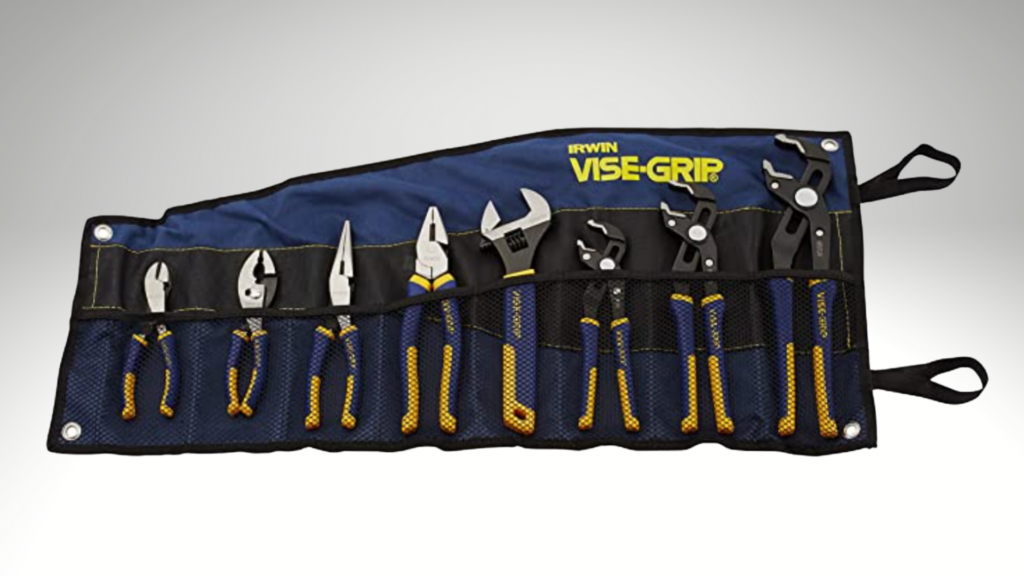
4. Wrench Set — Including Torque Wrench
Nuts and bolts tend to work themselves loose as your RV vibrates while going down the highway. Having a set of wrenches can be useful for keeping them tight. A quality wrench set will have a variety of sizes, which helps ensure you’re prepared no matter which bolts come loose on your RV.
Many RVers make the mistake of not having a torque wrench on their full-time RV tool list. These are essential tools as most RV manufacturers recommend torquing your lug nuts before every trip. Failure to do so can result in lugnuts breaking and a wheel coming loose.
5. RV Air Compressor
It doesn’t matter how far you’re towing your RV; you don’t want to tow your RV with low-pressure tires. Doing so causes the tires to heat up and can lead to a blowout. Having an RV air compressor on hand allows you to adjust your tire pressure as needed while RVing. These also make it easy to inflate pool toys and sports balls.
6. Bungee Cords
You never know what you’re going to haul in your vehicle or when something will need to stay in place. Bungee cords are a versatile tool you’ll want to have on hand. They can keep a propane tank in place during transit, secure your waste tank to your ladder, or serve practically an infinite amount of other purposes.
7. Zip Ties
If you want to improve your cable management or need a temporary fix to keep an item in place, zip ties can be a great option. These come in various sizes and strengths. They’re relatively inexpensive and great for temporary solutions while on the road. Some RVers even use reusable zip ties to organize hoses, extension cords, and other long pieces of equipment.
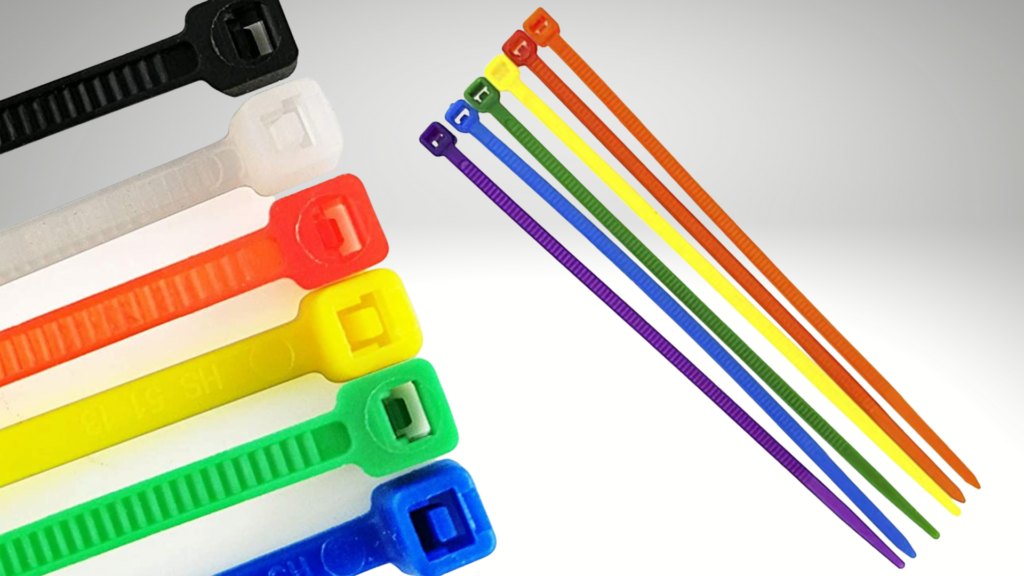
8. Extra Fuses
A typical RV will have a variety of fuses that keep the electrical system functioning safely. Fuses have a small piece of metal that will melt if a fault or too much current passes through them. This helps prevent damage to your electrical system and sensitive appliances. Blowing a fuse in an RV isn’t all that uncommon. Having an extra set of every size fuse is important because if you blow a fuse, you can’t use that appliance until you replace the fuse.
9. EternaBond Tape
Rips and tears in your RV roof can be troubling. Do whatever you can to prevent water damage to your roof and RV’s structure. A rip or tear can easily occur from branches or limbs rubbing against the roof. Even if you’re safe while towing, limbs or branches can fall while your RV sits in a campsite.
EternaBond acts as a patch for your roof and helps ensure moisture doesn’t impact your RV. Having a roll of EternaBond tape on hand means you can quickly and easily address roof issues. You don’t want to wait a few days for it to arrive. When it comes to roof damage, time is of the essence.
10. RV Sealant and Caulk Gun
Many RV manufacturers have offered warranties protecting the RV’s roof and structure for many years. However, these warranties typically require all seals to be checked and reapplied regularly. So it’s important to keep RV sealant on hand and have a quality caulk gun. A quality caulk gun will help you apply the sealant to leave a professional look.
11. Duct and Electrical Tapes
Having a supply of duct and electrical tapes is always good. These types of tapes are rather inexpensive and can be useful for a variety of tasks. If you’re doing electrical work, electrical tape is a must.
12. Multimeter
A multimeter is a useful tool for diagnosing electrical appliances. This simple tool can help you pinpoint faults in microwaves, air conditioners, and other appliances in your RV. Instead of replacing an entire appliance, you may only need to replace a broken switch or button. Once you familiarize yourself with how to use the device, you’ll likely use it every time you’re working with your RV’s electrical system.
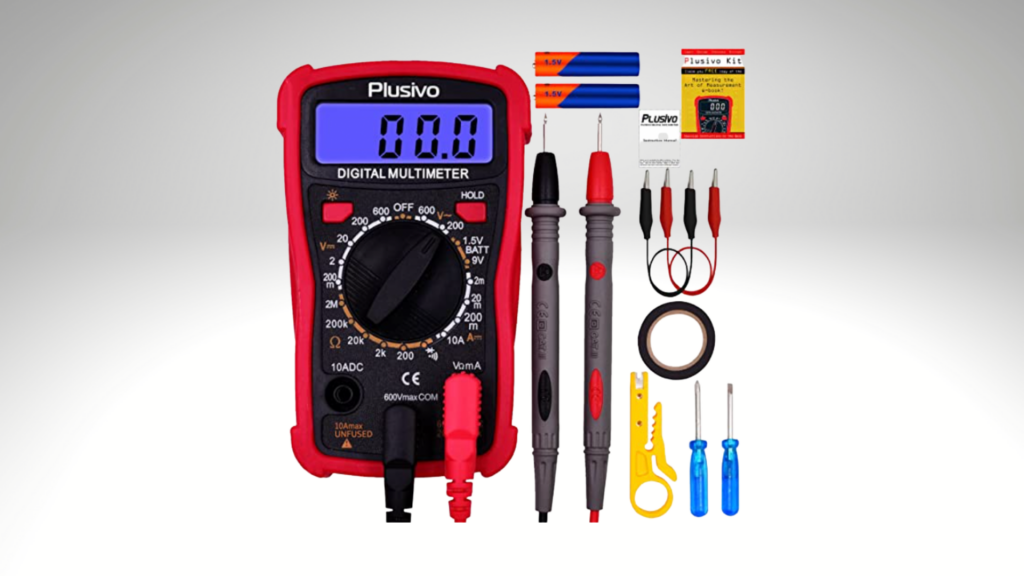
13. Socket Set
You can never have enough sockets while RVing. A quality socket set is a must-have for any full-time RV tool list. You want a socket set with a wide variety of sockets and extensions. Some nuts and bolts can be incredibly difficult to tighten without an extension.
If you already have a socket set, it’s worth going around your RV to look for bolts that might require a uniquely-sized socket. When you need to complete a repair, you don’t want any surprises.
14. Wire Strippers and Electrical Connectors
Many RVers love changing the look and feel of their RV by upgrading the lights. This can not only make your RV more comfortable but also homier. Wire strippers can help ensure you’re getting a solid connection between the old and new wiring. Having plenty of electrical connectors can help prevent serious situations by keeping wire connections from contacting conductive surfaces.
15. Utility Knife
You’ll find you need a utility knife quite often while RVing. Whether you’re opening a box, cutting rope, or cutting into your RV’s wall, you want a sharp blade. It’s also wise to stock up on blades for your utility knife. You should start every big job with a fresh blade.
16. Thread Seal Tape
Your RV’s water system has many connections that can develop leaks. Having thread seal tape on hand can enable you to quickly and easily seal up a leaky connection. It’s wise to apply thread sealant tape if you’re making any new connections to your plumbing system as well.
Even if you’re changing a faucet, it’s wise to do all you can to prevent a leak down the road. It only takes a few seconds and can save you a tremendous amount of trouble.
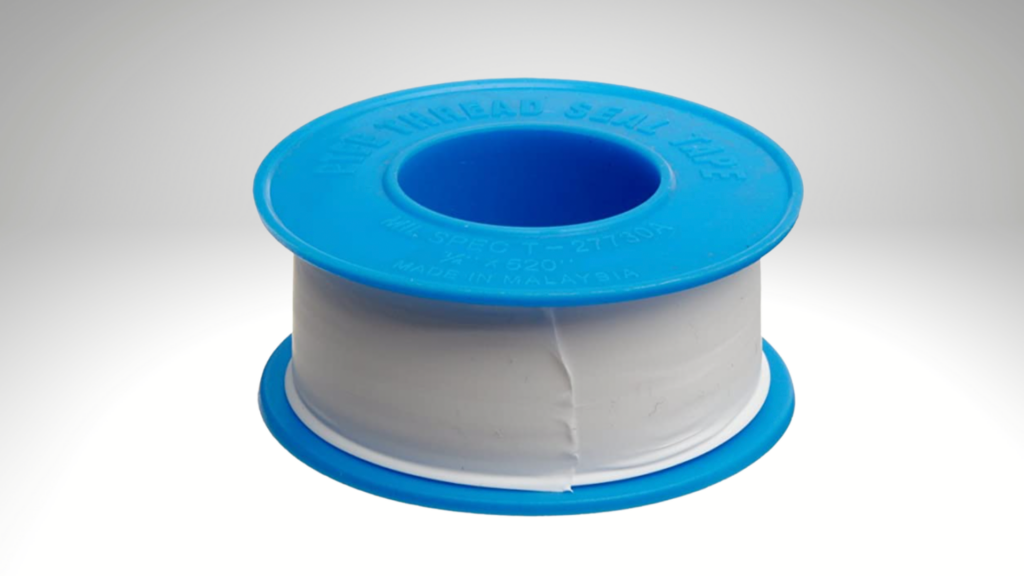
17. Work Light
RVs don’t just break during the daylight hours. Many mechanical issues happen at the most inopportune times. This means you’ll be doing repairs in the rain, cold, and dark. While a work light can’t do anything about rain or cold, having a bright work light can make seeing what you’re doing easier. However, a work light can also double for lighting up your campsite to avoid tripping over tree roots or other items.
18. Hammer
A hammer is useful for more than just putting nails into wood. Sometimes bolts and pieces of equipment get jammed or just need a little assistance in getting unstuck. A hammer can provide the encouragement that some of these items need to get unstuck. These can also be incredibly useful to have on hand for driving tent stakes into the ground to keep a tent or other sunshade from blowing away.
19. Oscillating Multi-Tool
Oscillating multi-tools are versatile cutting machines. They’re rather lightweight and provide very clean results. Whether you’re looking to cut, grind, scrape, sand, or saw wood in your RV, this is the tool for the job. If you’re planning to do any remodeling or customization, it’s wise to add this to your full-time RV tool list.
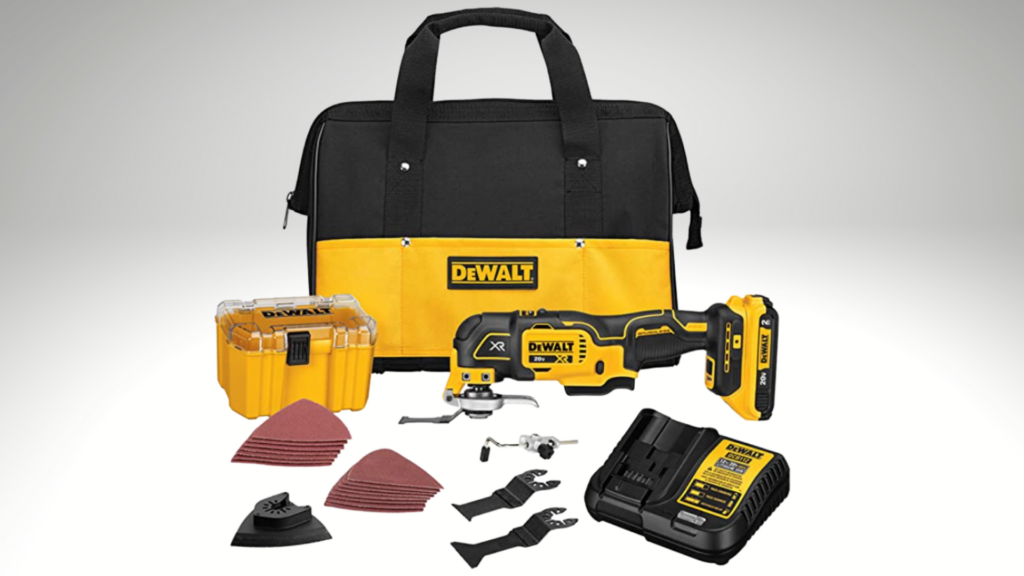
20. Telescoping Ladder
Your RV may come with a ladder for easy access to the roof, and that might be enough. However, a telescoping ladder can get you to reach hard-to-reach locations around your RV. Whether you’re doing routine maintenance or washing your RV, a telescoping ladder is great to have.
Don’t Hit the Road Without These Tools
Because RV life can be unpredictable, we suggest you not hit the road without these tools. You’ll use some of them more than others, but you’ll be thankful you have all of them if you do need them. What are the must-have items on your full-time RV tool list?

Leave a Reply